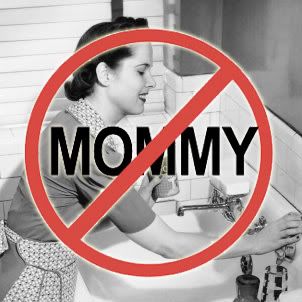Yikes. I just got through skimming the comments on the WSJ essay I extolled in my last post. With the exception of a few shining jewels of polite or even enthusiastic agreement, they are overwhelmingly critical and in many cases downright nasty.
Which, God knows, is not atypical in anonymous internet comments, especially in connection with articles about child-rearing or motherhood (more on that in a moment). Anyway, after reading them I was moved to dwell on this issue yet again to point out three things:
1.) Approximately half of the comment posters missed the essay's point entirely. They seemed to think Brodesser-Akner was complaining about her children calling her "mommy." Which I thought she made clear was not the problem. Her complaint involved the frequent use of the word by other adults to describe her, themselves, mothers in general, or any activity (blogging, working part time, bickering about work-family balance) in which mothers are, or supposedly are, involved.
2.) Those who, after reading an article, are going to take the extra time to log onto the site, compose a comment, and then post it, probably should not have the comment read, "This article was a waste of time." Why not waste a little less time by not adding a comment which is yet another waste of time?
3.) I can understand why, to many people, it may seem no big deal whether a woman with children is referred to (stressing again that we're talking by people other than her kids) as mommy, mother, mom, mama, ma, female parental unit, person of maternity or member of the child-rearing community. And sure, compared to, say, what’s happening in Japan, it isn't. But then, neither is probably 99.999 (add a bunch more 9s) of what's on the internet and only a slightly smaller proportion of what's reported in the WSJ, or any publication.
Still, the words we use to describe things actually are important. Media depictions of people and their roles are important. Those things shape our culture and influence the way we view each other and our contributions to society. Try this experiment: Say you're an employer, evaluating two comparable candidates for an important position. Both of their resumes indicate they're currently not in the paid workforce. In the interviews, you ask each what she's been doing. One says, "I work at home, caring for my children." The other says, "I'm a mommy."
All other things being equal, which one are you going to hire?
As I said in my last post, women's roles in business and politics have changed dramatically over just a couple of generations. Women's roles as mothers still lag behind. Mothers pay a wage penalty in the workplace compared to non-mothers with comparable jobs and backgrounds (including women without children and men either with or without children). Women still do the bulk of childcare and housework. As a culture, we're trying to figure out how to reconcile these things, still trying to work out the bugs. That's a big deal, and as we go through that process, the issue of what words we use, along with any number of other details, is indeed important enough to write about.
Dismissing mothers' concerns as "whining" or "overwrought" or "a waste of time" or "silly" or "trivial" or "yeah, yeah, we get it already" is incredibly common—even among people who are otherwise sympathetic to feminist concerns—for reasons I am still trying to understand. I hope to write about this, too, someday, because writing about something is often the best way to make sense of it. (If anyone can suggest a way to, say, google "whining" and determine how often words like those are used to apply to mothers compared to everyone else, I would greatly appreciate it.)
In the meantime, if we want people to take mothers' issues seriously, it doesn't help to refer to them as mommies' issues.



